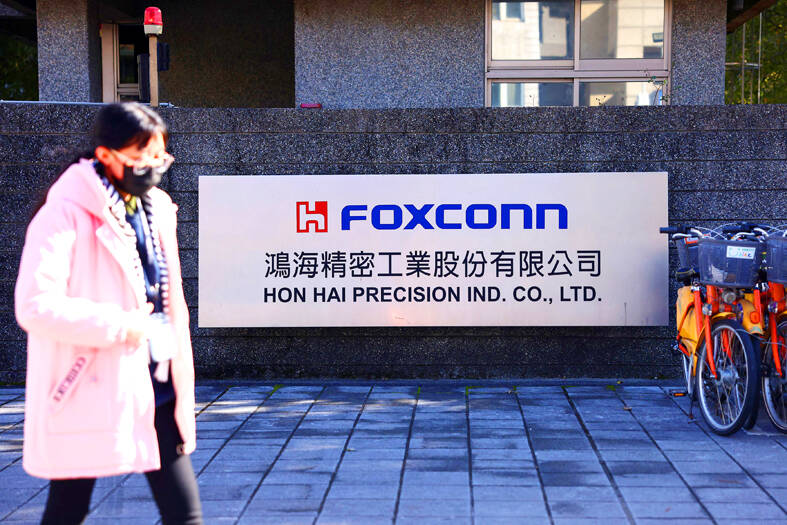A Hon Hai Precision Industry Co (鴻海精密) subsidiary has secured approval for subsidies from Indian authorities for spending and sales from its production base in the country under the Production Linked Incentive (PLI) scheme, the Indian Press Information Bureau said in a statement on Wednesday.
Foxconn Hon Hai Technology India Mega Development Pvt Ltd has been given the green light to receive about 3.57 billion rupees (US$43.1 million) for its spending and sales from Aug. 1 last year to March 21, the bureau said.
The unit of iPhone assembler Hon Hai, also known as Foxconn Technology Group (富士康科技集團) globally, is the first global mobile phone producer to be granted approval to receive subsidies under the PLI scheme, the bureau said.

Photo: Annabelle Chih, Reuters
The PLI scheme was launched by the Indian government in April 2020 to boost the country’s competitive edge in electronics production.
In addition to the Hon Hai unit, Padget Electronics Pvt Ltd, a wholly owned unit of Indian electronics maker Dixon Technologies Ltd, has also secured 583 million rupees, the statement said.
Approval for the subsidy application filed by the Hon Hai unit and another by Padget came from a committee organized by the Indian Ministry of Commerce and Industry’s Department for Promotion of Industry and Internal Trade, the Indian Ministry of Electronics and Information Technology and public policy think tank NITI Aayog, the statement said.
In late December last year, Hon Hai increased its investment in the Indian subsidiary by US$350 million, which industrial sources said was aimed at expanding the unit’s production at its plant in Chennai to roll out iPhone 13s.
Earlier this month, Hon Hai in a filing with the Taiwan Stock Exchange said that it had further raised investment in the Indian subsidiary by injecting an additional US$500 million, which industrial sources believed would be spent on the Chennai plant to produce iPhone 14s, the latest Apple iPhone series.
The sources’ comments echoed Indian news reports in September that Apple would produce iPhone 14s in Chennai, implying that Hon Hai Precision Industry would be in charge of the rollouts at a time when domestic COVID-19 outbreaks in China have reduced production from the Chinese operations of the Taiwanese company and many other foreign entities.
Hon Hai Precision Industry has solid experience in producing iPhones in India, having manufactured the iPhone XR, the iPhone 11 and iPhone 12 in Chennai, the sources said.

CHIP WAR: Tariffs on Taiwanese chips would prompt companies to move their factories, but not necessarily to the US, unleashing a ‘global cross-sector tariff war’ US President Donald Trump would “shoot himself in the foot” if he follows through on his recent pledge to impose higher tariffs on Taiwanese and other foreign semiconductors entering the US, analysts said. Trump’s plans to raise tariffs on chips manufactured in Taiwan to as high as 100 percent would backfire, macroeconomist Henry Wu (吳嘉隆) said. He would “shoot himself in the foot,” Wu said on Saturday, as such economic measures would lead Taiwanese chip suppliers to pass on additional costs to their US clients and consumers, and ultimately cause another wave of inflation. Trump has claimed that Taiwan took up to

A start-up in Mexico is trying to help get a handle on one coastal city’s plastic waste problem by converting it into gasoline, diesel and other fuels. With less than 10 percent of the world’s plastics being recycled, Petgas’ idea is that rather than letting discarded plastic become waste, it can become productive again as fuel. Petgas developed a machine in the port city of Boca del Rio that uses pyrolysis, a thermodynamic process that heats plastics in the absence of oxygen, breaking it down to produce gasoline, diesel, kerosene, paraffin and coke. Petgas chief technology officer Carlos Parraguirre Diaz said that in

SUPPORT: The government said it would help firms deal with supply disruptions, after Trump signed orders imposing tariffs of 25 percent on imports from Canada and Mexico The government pledged to help companies with operations in Mexico, such as iPhone assembler Hon Hai Precision Industry Co (鴻海精密), also known as Foxconn Technology Group (富士康科技集團), shift production lines and investment if needed to deal with higher US tariffs. The Ministry of Economic Affairs yesterday announced measures to help local firms cope with the US tariff increases on Canada, Mexico, China and other potential areas. The ministry said that it would establish an investment and trade service center in the US to help Taiwanese firms assess the investment environment in different US states, plan supply chain relocation strategies and

Japan intends to closely monitor the impact on its currency of US President Donald Trump’s new tariffs and is worried about the international fallout from the trade imposts, Japanese Minister of Finance Katsunobu Kato said. “We need to carefully see how the exchange rate and other factors will be affected and what form US monetary policy will take in the future,” Kato said yesterday in an interview with Fuji Television. Japan is very concerned about how the tariffs might impact the global economy, he added. Kato spoke as nations and firms brace for potential repercussions after Trump unleashed the first salvo of